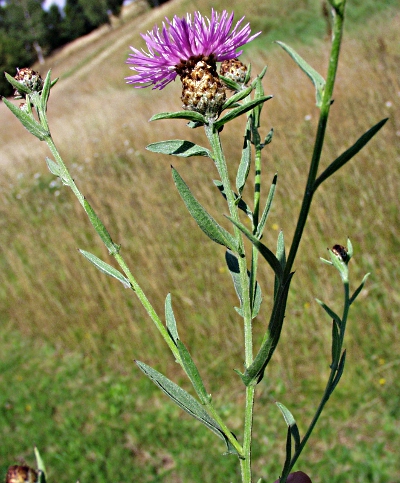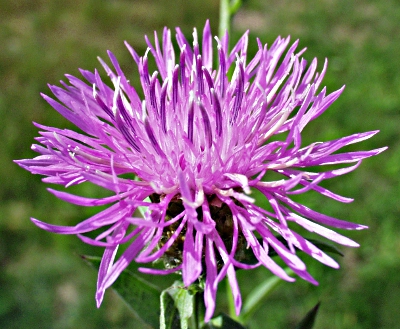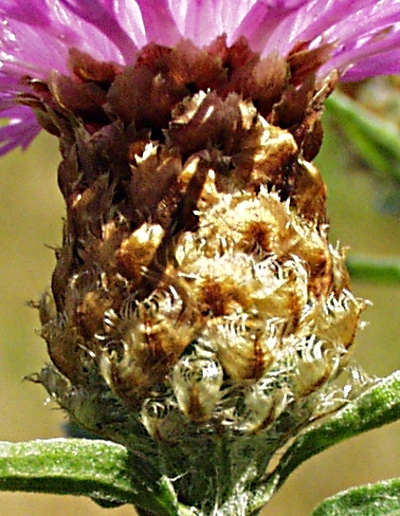Hybrid knapweed |



Habit, flower head and involucre of the hybrid knapweed
| Centaurea × gerstlaueri Erdner: | |
| Blooming period: | June–September |
| Height: | 30–120 cm |
| Flowers: | in heads, Ø of the heads 15–30 mm, stamens: 5, styles: 1 |
| Ray florets: | missing |
| Disc florets: | red violet |
| Calyx: | missing or transformed into bristles |
| Stem leaves: | alternate, oblong-lanceolate, entire to dentate |
| Basal leaves: | stalked, oblong to elliptic, entire to irregularly pinnatilobate |
Plant perennial, herbaceous, with taproot.
Stem erect or ascending, usually slightly branched in the upper part, grooved, shaggy haired, tomentose or coarse-haired, soon bare.
Stem leaves alternate. Lower leaves stalked, broad lanceolate, entire, pinnatilobate or only slightly serrated. Leaves in the upper part decreasing in size, linear-lanceolate, sessile, entire or toothed.
Flower heads usually solitary or a few ones in corymbose inflorescences on stalks that are sometimes thickened below the flower head and equipped with a bract. Receptacle flat and bristly.
Phyllaries in 6–8 rows, tightly imbricated. The outer and the middle ones are oblong to ovate, shiny light to dark brown, margins either thin, membranous, white, coarsely toothed to fringed or with white, light or dark brown, comb-shaped appendages. The inner phyllaries are irregulary slotted, serrated or lobed. Involucre ovate, hemispherical or bell-shaped, 15–18 mm in diameter.
The flower head consists exclusively of purple tubular florets, at the base without chaffy leaves.
Outer petals more or less greatly prolonged, sterile or fertile, radiate to zygomorph, 5-toothed. Inner ones almost radiate, fertile, 5-toothed, 15–18 mm long.
After the insect pollination the inferior ovary forms an up to 3 mm long flattened nut fruit (achene), which is finely hairy, elongated, flattened and without a pappus or with a few bristles at the apex.
Centaurea × gerstlaueri is a hybrid of C. jacea and C. nemoralis and may habitually be similar to one or an other parental species.
Centaurea × gerstlaueri can hybridize with its parental species and probably also with other knapweeds.
| floral formula mostly: |
| *–↓ K0 or K=bristles [C(5) A5(connate)] G(2) inferior |
Occurrence:
Meadows
and roadsides, waste places. Prefers slightly humid, sunny and sandy or
loamy soils.
Distribution:
Eurasia,
introduced in North America and/or developed out of the parental
species.